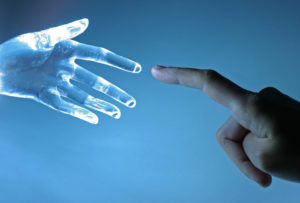AI and digital – what are they and how they benefit the NHS
During the recent King’s Fund online event, about digital transformation in the NHS, it was made hugely apparent that one of the issues that must be overcome isn’t just how we use digital technology, but what the jargon used on and around it means.
The confusion around the terms ‘digital’ and ‘artificial intelligence’ (known as AI) is also a concern as there is a huge difference between the two and this is often not acknowledged, which can cause problems down the line.
However, it is important to remember that digital technology isn’t here to complicate processes but to simplify them and do the hard work for us – either through AI or other methods.
Digital versus AI
 The term ‘digital’ in this instance refers to the use of computer networks for business and communication. ‘Artificial intelligence’ is a term used to describe the cognitive capabilities that can be achieved by and through those computers. The digital future of the NHS includes elements of AI, but this will not be the quintessential element of the experience.
The term ‘digital’ in this instance refers to the use of computer networks for business and communication. ‘Artificial intelligence’ is a term used to describe the cognitive capabilities that can be achieved by and through those computers. The digital future of the NHS includes elements of AI, but this will not be the quintessential element of the experience.
Moreso, those working digitally within the NHS won’t need to understand it in its granular state. One of the key speakers at the online event (link to initial blog) compared learning how to use the electronic and digital systems in healthcare to using Amazon. In this situation, consumers don’t comprehend all the ways in which digitisation is applied within the customer journey; it should be enough to understand how to use our part of the system to see how it benefits us and saves us time.
With Radar Healthcare, we make sure that all you need to focus on is your job – we manage the technology so you don’t have to.
Mixed messages
Mark Duman, one of the key speakers at the King’s Fund online event and Managing Director at MD Healthcare Consultants, emphasised that it’s not often AI that people are referring to when they talk about processes, it is in fact data sharing, which brings its own merits and disadvantages (link to ethics blog).
Ultimately, however, you shouldn’t have to have a master’s degree in computer science to be able to use a software platform at work. At Radar Healthcare, we ensure that our systems are named with easy-to-interpret terms and take on the responsibilities of making the digitisation manageable for healthcare professionals to use in their day-to-day activities.
To see how Radar Healthcare uses cutting-edge technology to simplify your working day, book a demo with us now!
Book a demo





